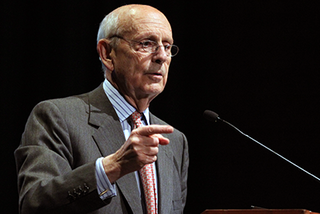Justice Breyer: Social Media Qs “Staring at Us in the Face”
Justice Breyer: Social Media Qs “Staring at Us in the Face”
Supreme Court Justice Stephen Breyer weighs in on social media at the APA
Posted May 25, 2016
This post is in response to Is Social Media Inevitably Sociopathic? by Ravi Chandra

Source: David Hathcox, from Psychiatric News
Here's what Justice Breyer had to say
Breyer: Well, I'm sure, yeah, lots of things have impact. We didn't really...it's a good example of the case because what, from our point of view and probably from the legal world's point of view, is not so important whether Mr. Elonis had to have a new trial or not. What is important is the standard, the standard which will separate what is criminal in terms of a threat from that behavior which is not criminal. And of course, the problem that you mentioned is right there staring us in the face. (Makes a wide gesture with his arms)
And so how do you write some words, which words when a prosecutor gives those words to a jury or the judge says, "This is your standard for deciding?" Is it recklessly aware, is he reckless in respect to the harm that it might do, where there is real harm? Is it that he has to know it? Is it that it has to be his purpose? Is it that it has to be negligent? Is that good enough? Or you say it's a problem of what is standard is. So the answer is, yeah, it's a big problem.
Question, how will we develop standards? Answer, we tried it in that case in one narrow area to figure out what would a workable standard be, and we'll get back. So that's where the profession...that's how the profession works in a sense. There will be a lot of people...the law professors will be there and they'll write articles about it. "The Supreme Court was absolutely wrong," or, "It was absolutely right," or, "It was sort of right but not." EtcAnd then the lawyers read those articles if they are relevant to a case, and they'll come back to us.
And then we'll be able to modify it, not directly overrule. You say, "Well, move in this direction or this direction, and the next case." And then the professors read that, and we get more feedback and criticism. It's a kind of circle. When it's working well, the academy has to see the bigger picture of how this fits over here with that. And the lawyers, good transmission build, then they work out what's practical. The courts listen and try to get it right. And when that is working, it's great. When it doesn't work, okay.
RC: Thank you, because there are a lot of children and women especially who are affected by these terrible comments online, so thank you.
Advertisement
How might neuropsychological information on the disinhibiting effects of online platforms affect the law? Should we decide that- “because social media is inherently disinhibiting, we shouldn’t take anything on social media seriously?”
- Or is it that “Since social media is disinhibiting, should threats delivered on social media be taken more seriously because it indicates that this individual is more likely to be disinhibited under the influence of social media, and therefore may be more likely to be disinhibited and carry out threats?”
- Or is the effect on the target paramount, in terms of psychological damage?
(c) 2016, Ravi Chandra, M.D. F.A.P.A.
Occasional Newsletter to find out about my book-in-progress on the psychology of social networks through a Buddhist lens, Facebuddha: Transcendence in the Age of Social Networks: www.RaviChandraMD.com
Private Practice: www.sfpsychiatry.com
Twitter: @going2peace http://www.twitter.com/going2peace
Facebook: Sangha Francisco-The Pacific

Comments
Post a Comment